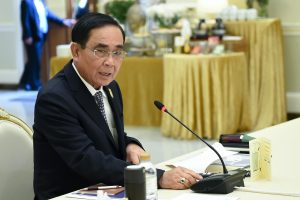Thailand’s Prime Minister Prayut Chan-o-cha has announced his retirement from politics, nine years after he took power in a coup as army chief.
“From now on I want to quit politics, resigning as a member of the United Thai Nation Party,” he said in a statement released by the party yesterday, the Bangkok Post reported, two days before his term as PM comes to an end with a parliamentary vote that will select his successor.
In his statement the 69-year-old former general claimed to have “achieved many successes” since leading the coup that overthrew Prime Minister Yingluck Shinawatra in 2014.
“I as prime minister have worked hard to protect the nation, religion and monarchy for the benefit of the beloved people. The result is currently bearing fruit for the public,” he said. “I have tried to strengthen the country in all areas for stability and peace and overcame many obstacles domestically and internationally.”
Indeed, given that he has never enjoyed a substantial popular mandate, Prayut has shown surprising staying power. He has survived legal challenges, votes of no-confidence in the House of Representatives, and large street protests in 2020 and 2021 that called for his resignation and the junking of the military-drafted constitution that helped him retain power as a “civilian” leader after the 2019 election.
Prayut’s announcement comes after his United Thai Nation Party (UTNP) turned in a humiliating performance in the general election in May, winning just 36 seats in the 500-seat House of Representatives, far behind the progressive Move Forward Party (MFP), which won 151 seats, and the opposition Pheu Thai Party, which won 141.
Even then, there was some talk that Prayut might be put forward as a prime ministerial candidate as an alternative to the MFP’s Pita Limjaroenrat, who is not guaranteed to have the votes necessary to become prime minister. But these plans foundered after the UTNP’s likely partners, including the military-backed Palang Pracharath Party, which supported his candidacy in 2019 and from which he defected late last year, also performed poorly. The UTNP stated last week that it would not nominate any of its leaders for the prime ministerial vote, because it did not support the formation of any minority government.
The Thai leader was not a politician. Prayut has described himself as “a soldier with a democratic heart,” working to cleanse his nation of corruption. Born in 1954 into a military family in Nakhon Ratchasima in Thailand’s northeast, Prayut rose from military college to become commander of the prestigious Queen’s Guards – also known as the Eastern Tigers – in 1980.
For a profile of Prayut that I wrote back in 2015, Paul Chambers, a specialist on the Thai army, told me that the Eastern Tigers, which are based in Chonburi close to Bangkok, amassed considerable wealth by trading gems with Cambodian Khmer Rouge insurgents based along the two countries’ border during the 1990s, a racket which “directly benefited” the faction and some of its commanders.
Prayut’s membership in the Eastern Tigers, then led by Gen. Prawit Wongsuwan, saw his promotion to army chief in 2010. That year, forces under his command opened fire and killed scores of “red shirt” protesters, mostly supporters of former Prime Minister Thaksin Shinawatra, who was ousted in an earlier coup in 2006. Then came the 2014 coup.
Prayut’s retirement is unlikely to have much of an impact on the broader political landscape. While conservative parties performed poorly at the May election, the structures of power that they exist to defend remain very much intact. Even in Prayut’s absence, they can be expected to continue with their campaign of obstruction against the MFP, even if it is successful this week in its bid to form Thailand’s next government. When one soldier falls, another steps into the breach.

































